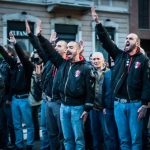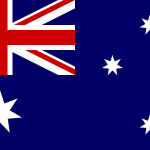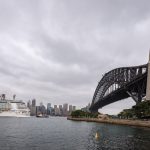Mobilising Against White Nationalists: An Interview with CARF’s Tess Dimos

Milo Yiannopoulos is a name that seems to crop up on your Facebook feed as you flick through it from time to time. A quick scan of his Wikipedia page reveals that he’s a British alt-right figure, who is anti-Islamic, anti-feminist and anti-social justice.
Now, Yiannopoulos is embarking on a speaking tour of Australia over the next week, and most of his shows are sold out. These events are being hosted by Australian far-right commentators Andrew Bolt and Mark Latham.
And this man, who’s associated with white supremacists, has even been invited to speak at Parliament House by Liberal Democratic senator David Leyonhjelm. In an email, the senator described the Q&A appearance as “a very interesting event that is unlikely to be repeated.”
But, many Australians are questioning why Yiannopoulos is being given such a fanfare. Australian Greens leader Richard Di Natale has written a letter to the Senate president asking that he be banned from his Canberra meeting with parliamentarians.
While the Campaign Against Racism and Fascism (CARF) are protesting Yiannopoulos’ Melbourne appearance on December 4. The group is planning to disrupt the event, which they see will further fuel the prejudices of the local white nationalist groups they’ve been working to shut down.
Misguided sentiments
Over the last couple of years, there’s been a resurgence in right-wing groups in this country. Reclaim Australia was the first of the new white nationalist groups to take to the streets draped in Union Jack flags and sporting Southern Cross tattoos.
The group organised rallies in major cities across the country in early 2015, where participants spouted anti-Muslim rhetoric and claimed they were patriots. And before too long other groups emerged, like the United Patriots Front and the Party of Freedom.
But, much of what these groups espouse as being a “true Australian” has nothing to do with the multicultural society one finds on any street corner. The values that these nationalists hold dear hearken back to a colonial past that was never purely white.
And the land they propose to reclaim was actually stolen from the First Nations peoples of this continent.
Nationalists in the parliamentary chamber
Standing on the sidelines, fanning the flames of this racist sentiment has been a select group of right-wing politicians. Liberal MP George Christensen spoke at a Reclaim Australia rally in mid-2015, claiming he was defending the nation’s “freedoms against the threat of radical Islam.”
Australian Conservative senator Cory Bernardi, who’s referred to the Islamic faith as a “totalitarian, political and religious ideology,” throws his weight behind the Q Society: a more refined group of white nationalists that wear suits and meet for right-wing dinner parties.
And then there’s Australia’s quintessential racist politician Pauline Hanson, who proclaimed the nation is “in danger of being swamped by Muslims” in her Senate maiden speech. Of course, she too fronted up for a Reclaim Australia rally back in 2015.
A united front
CARF is made up of a diverse range of groups with the common aim of preventing “fascists and their far-right allies from building” a cohesive movement in Australia. The group mobilises against white nationalist rallies, and their impact has been successful.
Sydney Criminal Lawyers® spoke with Tess Dimos, an organiser of CARF, about the prevalence of white nationalist groups today, why it’s necessary to remain vigilant against the far-right, and who this Milo Yiannopoulos person actually is.
Firstly, Tess, there’s been a recent rise in white nationalist groups in this country. In your understanding, what’s led to it?
In large part it comes down to the way that mainstream politics operates in this climate, because there’s been a general rise in Islamophobia, and anti-refugee racism.
Refugees and Muslims are very much used as a scapegoat for any political party that is looking for something that they can pitch an election around, or a way to distract society from some of the key issues that people are facing, like lack of funding for healthcare, and cuts to Centrelink staff.
Instead of these kind of issues, the main focus of the political parties has been on Islamophobia and racism.
Just before the rise of Reclaim Australia, there’s was a massive escalation of Islamophobia from the Abbott government, in which there were cases of Muslim women having their hijabs torn off in the streets, tubs of yoghurt thrown at them, and being harassed at train stations.
That’s what has led to these white nationalist groups, in which often there is a very small nucleus of crazy people that believe in these points of view.
When these new right-wing groups first emerged they made a big impact, and received a lot of media attention. But, that seems to have died down.
Just how large would you say these groups are today? And what sort of threat do they pose in the community?
When Reclaim Australia first emerged, they had that protest in Melbourne at Federation Square. And this was a demonstration that we organised a counter-protest to. That was basically the time when CARF first established.
They would have had a few thousand people turn up. We picketed around the exists of Federation Square to try and make it clear that if people wanted to go to this demonstration, they were going to be called out for being white supremacists.
And since then, their mobilisations have died down. The last demonstration that they tried to have was organised by Avi Yemini and called Make Victoria Safe Again – taken from Donald Trump. That protest only had about forty people at it.
Every time they’ve had demonstrations we’ve been out to counter them.
The attempts to organise resistance to these far-right groups, and their mobilisations, has had a really big impact on whether or not people who might not be hardened fascists, but agree with some of the things these people say, are willing to go out and openly support these groups.
So, a group like CARF is having an impact on more moderate nationalists coming out and showing their support?
Yeah, it’s had a big impact on stopping them from being able to grow.
Earlier this month, Labor senator Sam Dastyari was subjected to an Islamophobic attack by members of Patriot Blue. As you mentioned, anti-Muslim incidents like these have been occurring in Australia, and most often to women in public wearing hijab.
But, do you think these attacks are as prevalent today, as they were a few years back?
It’s hard to tell. A lot of the information that you get depends on what the media is willing to report. At that time, definitely there was a big uptick in the number of Islamophobic attacks.
But, the ones that you see now, it’s not the ordinary members of the public attacking Muslims in the street. It’s much more the hardened neo-Nazis that are trying to build organisations.
The person who harassed Sam Dastyari his name is Neil Erikson. He’s the same person who was put on trial recently for Islamophobia. And he’s the same person who attacked a recent refugee demonstration. So, he’s one of the people who is trying to build these far-right groups.
I think we have seen less of the general public behaving in racist and abusive ways.
Over this same period, there’s been a rise in far-right politics. However, Pauline Hanson’s One Nation performed badly in last weekend’s Queensland election and the WA election earlier this year.
Do you think Hanson’s on the way out, or should we still be wary of her potential to garner support in the community?
We should still be very wary of her. Even as a very minor politician that is not getting large support from the electorate, she’s still a very public figure. She still gets a lot of media attention. She still tries to raise a platform for herself. She’s still sitting in parliament.
These kind of things mean that we should be extremely wary of the attempts that she is making to pull politics and Australia to the right, as well as trying to pull people’s perception of Muslims and refugees towards a more negative perception.
It’s a very different situation having her completely on the outskirts to having her constantly being interviewed in the media and in parliament.
But, it’s extremely positive that she didn’t get a seat in the Queensland elections.
Do you think the mainstream media is somewhat complicit in the support that she gains from the attention she gets?
Absolutely. Even before she got re-elected to parliament in 2016, she would be interviewed on Sunrise every time there was some sort of terrorist attack. And they painted her like she was some sort of expert on terrorism.
She had massive media even when she was out of politics. And now, it’s like she’s the go-to person when something scandalous happens, so that she can try and drum up more fear towards refugees and Muslims.
Now, Milo Yiannopoulos is about to undertake a speaking tour of Australia. His shows have sold out. And he’s even been invited to federal parliament to hold a Q&A with ministers.
Who is this guy? And why he’s gaining so much traction in this country?
It’s crazy. I can’t believe how much attention he has gotten. He’s basically the celebrity figure for the alt-right internationally.
He’s toured around the university campuses in America, just to try and drum up more support for alt-right politics. There’s an infamous image of him holding up a “Feminism is cancer” sign.
But also, when he was speaking at these events, he would try and encourage people to name immigrants, so that the border force in America, under Donald Trump, would deport them.
He used to be one of the main mouthpieces for Breitbart News, which is the publication that was put out by Steve Bannon, Trump’s chief of staff, who’s quite a notorious white supremacist.
And more recently, Yiannopoulos was caught on film attending a karaoke bar with Richard Spencer, who was the guy who organised the protest at the Virginia University campus, where they were chanting, “Jews will not replace us.” He’s pretty much an open neo-Nazi.
At this karaoke bar, Milo sang an adoration for the American flag, whilst Richard Spencer, and a bunch of their other friends, did a Heil Hitler salute.
Yiannopoulos does, when asked directly, try and distance himself from Nazism and fascism and occasionally from the alt-right. But, he says the exact same things as them. And his meetings and tours are attended widely by members of the alt-right.
He’s very much contributing to the growth of the alt-right in America and now in Australia.
CARF is set to protest his appearance in Melbourne on December 4. What’s that going to entail?
We want to have a demonstration that shows there are people in Melbourne that oppose this guy, given the huge amount of airtime, and the very little criticism, he’s gotten in the media.
What’s needed is people that are willing to say, “No, we oppose this guy.” And who are willing to call him out for being a white supremacist.
At the protest we are having, we want to try and disrupt the event, and try and use the numbers on our side to voice our opposition to the politics that he’ll be discussing on that tour.
Often when CARF mobilises you’re actually facing off these white nationalist groups.
What usually happens when you do mobilise against these groups that seem to be made up of mainly angry men? Do things ever get out of hand?
The orientation that CARF has to mobilising against those groups is collective organised demonstrations, in which we use our numbers and our voices to try and counter the alt-right.
At the protests we have, we try and organise linked arms and very tight demonstrations to make sure that we all stay together and are safe. And that we can effectively stop these white nationalists being able to march freely through the streets and harass Muslims in the city of Melbourne.
Now, they’re going to be showing up at the Milo Yiannopoulos demonstration. Neil Erikson has called for a protest to defend Milo Yiannopoulos on the night.
We will probably have two demonstrations at that event. One which will be the anti-racist demonstration. And one which will be the Milo Yiannopoulos demonstration.
It will be important for the safety of the demonstration, and for the impact that we have on showing opposition, to have as many people there as possible, so that we’re not a minority in comparison to these far-right groups.
Your group has also been demonstrating against the humanitarian crisis that is unfolding on Manus Island.
Can we see a link between the treatment of these asylum seekers by the federal government, and the attitudes and actions taken by the white nationalists?
Absolutely. It gives them fodder for all of their arguments, when they see on the news refugees who have been beaten up by security guards, and having their water thrown out. Some of these refugees have posted footage of guards coming in and beating them up with metal poles.
It just reinforces all of the arguments that the white nationalists are trying to make. That it’s OK to go around beating up Muslims and refugees.
It’s so important now that there are groups like CARF that are willing to stand up against that.
So, Campaign Against Racism and Fascism has been together for a few years now. Can you tell us about how you formed?
We formed around the time of that first Reclaim Australia protest. That was really the starting point of the far-right groups trying to organise street mobilisations.
And these are obviously very dangerous if you look at what went on in America in those demonstrations in Charlottesville that saw a woman killed.
If you look at the mobilisations of the far-right in Europe, there’s been regular beatings of Muslims, and attempts to go around burning mosques. They can be very dangerous once they start mobilising on the streets.
After that first Reclaim Australia demonstration, that was when we set up the Campaign Against Racism and Fascism, and put out an open invite for anyone that wants to get out on the streets and stop these people from being able to march, as well as trying to coordinate actions to oppose the far-right in Melbourne.
We put out the call for people to come and attend those meetings, and help us organise the resistance.
And lastly, at this time last year, Trump had just come to power, Brexit had taken place, One Nation had four senators in the federal parliament, and these white nationalist groups were getting more attention.
Is the rise of the right-wing beginning to subside, or do groups like CARF need to remain vigilant?
We absolutely need to remain vigilant. There’s no indication that they’re starting to subside, particularly if you look at some of the advancements of the right in Europe at the moment.
The Alternative for Deutschland party in Germany got a much more sizeable showing than they have in any previous election. Marine Le Pen and her political party in France also made it into the second round of elections there.
And certainly in Australia, if you’re looking at what’s happening on Manus Island, as I said, it’s just fodder for far-right groups to try and keep growing.
So, we absolutely need to remain vigilant. And we need more people involved in trying to stop these groups from being able to grow, and do in Australia, what they are trying to do in places like Europe and America.
Tess thanks very much for taking the time out to have this chat with us today.
No worries at all.







